The Latest News and Updates
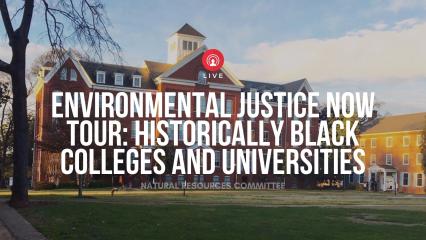
Sep 23, 2020
Environmental Justice Now Tour: Historically Black Colleges and Universities
The House Committee on Natural Resources hosted an HBCU Environmental Justice Forum. Remarks summarized a history of environmental racism in the United States, how HBCUs are training the next generation of black environmental scientists, and the significance of the Environmental Justice for All Act to frontline black communities. Environmental Justice Now Tour: Historically Black Colleges and Universities YouTube Recording September 23, 12:00pm 1:30pm EDT/9:00am- 10:30am MST Dr. Beverly Wright- Executive Director, Deep South Center for Environmental Justice Dr. Robert D. Bullard - Professor of Urban Planning and Environmental Policy, Texas Southern University Dr. N’Taki Obsorne Jelks - Assistant Professor, Environmental and Health Sciences, Spelman College Ms. Joy Semien - graduate of Dillard University (B.S.), Texas Southern University (M.A.), Doctoral Student, Urban and Regional Sciences, Texas A & M University ...

Sep 17, 2020
Environmental Justice Now Tour: Louisiana Cancer Alley
Dr. Beverly Wright, Executive Director of the Deep South Center for Environmental Justice (DSCEJ), spoke at the Environmental Justice Now: Louisiana Cancer Alley Roundtable. U.S. Congress members Raul Grijalva (D-AZ) and Don McEachin (D-VA) conducted a special roundtable, Environmental Justice Now: Louisiana Cancer Alley, a series of roundtables they are hosting across the nation. Other featured speakers included:Sharon Lavigne, Director of Rise St. James, and Asti Davis, Foundation for Louisiana - Climate Justice Network Engagement Manager Thursday, September 17, 2020 Environmental Justice Now: Louisiana Cancer Alley Roundtable YouTube Recording Check out the DSCEJ Surviving Cancer Alley Report. Learn more about the Environmental Justice for All Act: Fact Sheet Full text of legislation ...
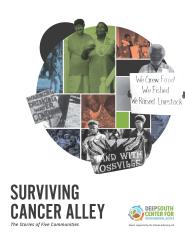
Aug 21, 2020
Surviving Cancer Alley: A Story of Five Communities!
The Mississippi River Chemical Corridor produces one-fifth of the United States' petrochemicals and transformed one of the poorest, slowest-growing sections of Louisiana into working class communities. Yet this growth has not come without a cost: the narrow corridor absorb more toxic substances annually than do most entire states. An 85-mile stretch along the corridor, infamously known as "Cancer Alley," is home to more than 150 heavy industrial facilities, and the air, water, and soil along this corridor are so full of carcinogens and mutagens that it has been described as a "massive human experiment." According to the Centers for Disease Control, Louisiana has consistently ranked among the states with the highest rates of cancer. Geographic Information System (GIS) mapping by the Deep South Center for Environmental Justice not only shows a correlation between industrial pollution and race in nine Louisiana parishes along the Corridor, but also finds that pollution sources increase as the population of African Americans increases. (Read DSCEJ Surviving Cancer Alley Report) ...
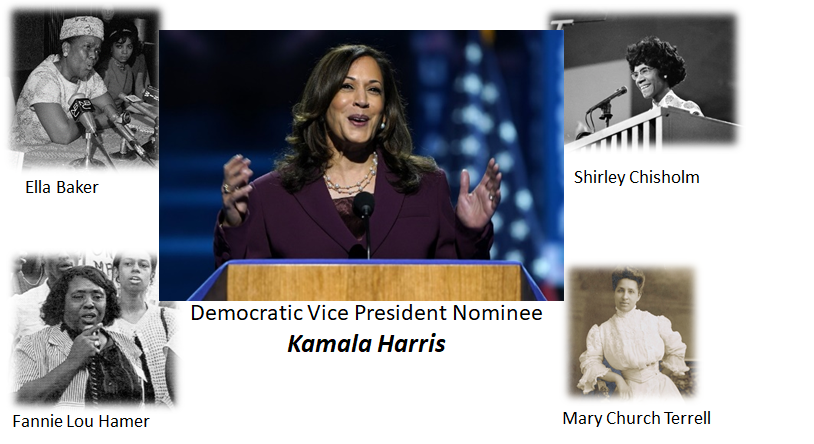
Aug 21, 2020
As black women, our time has come!
"As black women in this century living in the United States, our time has come! While we have always been strong in the midst of adversity, receiving accolades for heroism earned throughout history, demonstrated through the lives of Harriet Tubman, Sojourner Truth, Fannie Lou Hammer, Ella Baker, Rosa Parks, Shirley Chisholm and so many more unnamed black women, we are no longer invisible. Kamala Harris, being named the Vice Presidential running mate of presidential nominee Joe Biden on the Democratic ticket, is not just symbolic of our struggle for equality, but represents authentic change. It says we are still here, and now you see us. Black Women Power!" Beverly L. Wright, Ph.D. ...

Aug 18, 2020
From the Director’s Corner – Summer 2020
Hello Friends and Supporters of the Deep South Center for Environmental Justice, I hope this letter finds you and yours well and in good health. I express my condolences to all of you who have lost loved ones during this terrible pandemic. You have my deepest sympathies. In ordinary times, my Director’s Letter would be filled with descriptions of the amazing work the Center is doing with equally amazing people, but these are not ordinary times. Consequently, I will deviate somewhat from my usual format to focus instead on how the pandemic, pollution, climate change and racism interconnect in ways that devastate and further endanger the health of our communities. This deviation has in fact led to my decision to dedicate the entirety of the newsletter to sharing the work of the Center with you. I can personally report that we are in fact working, planning, strategizing, organizing and advocating for justice in all areas. In particular, we are working with environmental justice communities on ways to build community resilience to climate change, advocate for and work to build sustainable communities and fight for climate change policy that supports all of the above. Over the last three years, our reach into the Gulf Coast region, has expanded more deliberately to include three additional states; Alabama, Florida, and Mississippi and continues to grow in conjunction with the policy work we are doing in Louisiana and Texas. It is our intention, through our programming, to create a Gulf Coast Network for Climate Justice Policy, the mission of which is to develop regional policies that support community resilience and sustainability in the face of climate change. The challenges inherent to our work are exacerbated in the midst of the COVID-19 pandemic. The Coronavirus has landed a knockout punch to our communities, registering a death rate for African-Americans that is disproportionately higher than our white counterparts. COVID-19 literally hitches a ride with air pollution (PM 2.5) and lodges deep within the respiratory system, causing severe harm that all too often results in death. The mortality rate for African Americans due to the virus is 8 times higher than for white Americans, and as shown by a Harvard University study, is greater because of housing patterns and discrimination that has relegated nearly 79% of African Americans to living in communities with high levels of air pollution. This correlation is not lost on researchers nor is it lost on environmental justice community members who have been railing against polluting facilities and toxic air in their communities for many years. When added to the strain of living with a pandemic that is more harmful to the African Americans than others, and the killing of George Floyd in plain sight, the realization that race is the major driver for this phenomenon of disproportionality in COVID deaths, one can hardly fathom the sobering nature of this moment for us all. The convergence of these factors indeed makes for life changing, even paradigm-shifting epiphanies, calling to all that is human in each of us. For African Americans in particular, this moment has meant watching close friends, family members, acquaintances and colleagues fall victim to the virus with no real answers, igniting in us, feelings of sadness and anger; feelings that have become constant companions for many these days. So I write this letter reflecting on what has been painfully clear; that speaking and living truth is never easy, but is always necessary. Know, my dear friends, that this is why we do this work. From our very beginning when we responded to community calls from those living in Cancer Alley; to the cries of Environmental Justice communities across the country; to Katrina and climate change impacted communities within this nation; to those whose communities and livelihoods were devastated by the BP Oilspill; to the families, friends and neighbors of George Floyd, Breonna Taylor and countless others seeking justice because, yes, Black Lives Matter; to those whose businesses, jobs and lives are threatened by COVID; we want you all to know that the Deep South Center will be here to assist in your fight for justice.Thank you for your support. In Solidarity in the Struggle for Justice Beverly Wright, Ph.D. ...
Aug 3, 2020
Finance and Operations Manager
Finance and Operations Manager The Deep South Center for Environmental Justice is seeking an experienced Finance and Operations Manager. We are interested in hiring a highly motivated person who can perform day-to-day accounting including grants management, prepare financial reports, and administer office operations. About the Organization The Deep South Center for Environmental Justice (DSCEJ) is a nonprofit organization dedicated to improving the lives of children and families harmed by pollution and vulnerable to climate change in the Gulf Coast Region through research, education, community and student engagement for policy change, as well as health and safety training for environmental careers. Currently, the DSCEJ employs 13 people. The DSCEJ directs projects involving universities and community-based organizations in seven states. The DSCEJ was founded by Dr. Beverly Wright in 1992 in collaboration with community environmental groups and universities in the Southern region to advance environmental justice. Since this time, the DSCEJ has become a powerful resource for environmental justice research, education, advocacy, as well as health and safety training for environmental careers. The DSCEJ provides opportunities for communities, scientific researchers, and decision makers to collaborate on projects that promote the rights of all people to be free from environmental harm as it impacts health, jobs, housing, education, and quality of life. A major goal of the Center continues to be the development of environmental justice leaders in African American and other communities of color along the Mississippi River Chemical Corridor and the broader Gulf Coast Region. Position Overview The Finance and Operations Manager oversees the day-to-day financial and administrative operations of the DSCEJ. This position is responsible for grants management, performing all accounting and banking functions of the organization, logging and maintaining financial data using QuickBooks, and generating financial reports. In addition, the Finance and Operations Manager performs office administrative tasks, human resources duties, and other assignments related to the financial health and operation of the organization. This is a full-time position in New Orleans, LA. The Finance and Operations Manager reports directly to the Executive Director. At times, this position requires travel and extended hours. Position Responsibilities Finances Perform accounting and financial analysis for grants management. Manage the overall accounting and bookkeeping, including accounts payable and receivable, inventory and capital assets, banking, and payroll functions. Process reimbursements, purchase and check requests for DSCEJ staff. Oversee payroll. Work closely with the Executive Director to account for revenue for all development initiatives, including but not limited to creating and monitoring all grant budgets and grant related financial information; processing and tracking all forms of donations; and generating revenue reports. Accurate data entry and maintenance of all financial data using QuickBooks. Interface with accounting personnel to coordinate annual financial audits and oversee all 990 reports. Facilitate the annual budget process. Generate financial reports and analysis of financial statements, including statement of activities, fund balance, and sources/uses of funds on a monthly basis and as needed. Provided administrative assistance, including oversight of facility contracts, and establishing and managing vendor accounts and relationships. Operations Responsible for office management including, but not limited to, telephone and internet services, connecting with building management, postage and UPS services, copier and all office equipment. Analyze and organize office operations and procedures to increase efficiency and productivity. Oversee benefit programs for all staff. Coordinate travel arrangements to ensure proper expense accounting for all staff. Assist the Executive Director with managing the interests of the organization. Assist the Executive Director on additional assignments, as needed. A flexible, creative, entrepreneurial spirit and a shared for the mission, vision and values of the DSCEJ. An approachable nature and ability to handle questions and requests timely. Exceptional written and oral communication skills. Ability to work independently and complete tasks. Ability to contribute and collaborate with the team and across the organization. Strong analytical and organizational skills. Experience working with diverse constituents, teams and colleagues. Ability to employ flexibility and creativity in the face of ambiguity and challenge. Organizational and project management experience. Required Skills and Qualifications Bachelor’s degree in accounting, business or related field. Minimum of five years of experience in nonprofit management, grant account management and financial reporting. Excellent time management skills and ability to meet deadlines. High work ethic and integrity. Proficiency in Microsoft Word and Excel programs, QuickBooks program, and Google environments. Salary & Benefits Competitive salary and benefits package commensurate with qualifications and experience. Salary range: $55-65K. It is the policy of the Deep South Center for Environmental Justice to provide equal employment opportunities without regard to race, color, religion, sex, national origin, age, disability, marital status, veteran status, sexual orientation, gender identity, genetic information or any other protected characteristic under applicable law. HOW TO APPLY: Please email a detailed cover letter highlighting your interest, your resume and three professional references in Microsoft Word documents to maryw@dscej.org. Please include the Finance & Operations Manager Position in the subject line. ...

Jul 9, 2020
Why the Larger Climate Movement is Finally Embracing the Fight Against Environmental Racism
Fight for Environmental Justice The 2019 fire at the Philadelphia Energy Solutions refinery started with a simple failure: one leaky elbow pipe in a 1,400-acre facility covered with pipes, tanks and industrial towers. Within a few hours last June, enough gaseous propane had seeped into the air to ignite the facility into a fiery hellscape with an explosion hurling human-size pieces of industrial equipment into the air and shaking the ground miles away. Read more ...
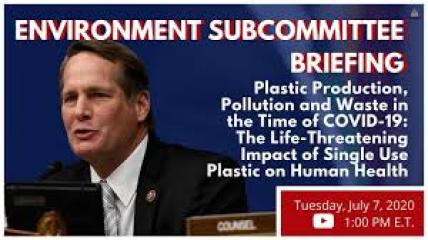
Jul 7, 2020
Environmental Subcommittee on Plastic Production Pollution and Waste
The Subcommittee on Environment held a virtual briefing on the effects of plastic production and pollution on Americans’ health. Environmental Subcommittee on Plastic Production, Pollution, and Waste Watch on YouTube Read the statement to the Subcommittee on Environment by Monique Harden, DSCEJ Assistant Director of Public Policy/Communty Engagement Program Manager
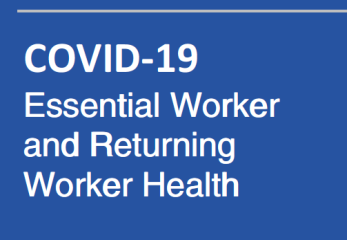
Jul 6, 2020
COVID-19 Essential Worker Health Trainings
You Must Register to Attend. All Community Awareness and Disaster Preparedness Trainings are conducted by experts in community health, workplace safety, as well as disaster preparedness and response. Important Registration Info: Once registered you will receive a confirmation email that includes information on how you can join the selected training. COVID-19 Essential Worker and Returning Worker Health Saturday, July 11 @ 12:00 noon - 2:00 pm CT on Zoom To register, click here Repeat - COVID-19 Essential Worker and Returning Worker Health Tuesday, July 21 @ 6:00 - 8:00 pm CT on Zoom To register, click here Repeat - COVID-19 Essential Worker and Returning Worker Health Thursday, July 23 @ 6:00 - 8:00 pm CT on Zoom To register, click here Learn More Funded by: National Institute of Environmental Health Sciences ...
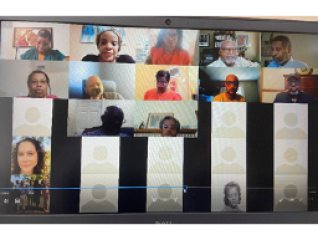
Jun 18, 2020
Caring Is Training
Stop the Spread Community Awareness Initiative: Where Caring Meets Training DSCEJ Educates Communities on How to Stop the Spread of COVID-19 June 2020 "We are living in a global pandemic of a new and highly infectious virus that is taking the lives of Black people at a rate that is three times higher than White people in this country. We have developed specialized trainings based on science that provide people in vulnerable communities with clear and accurate information on how they can protect their health and stop the spread of COVID-19." Dr. Beverly Wright, Executive Director of the Deep South Center for Environmental Justice Over the past four months, as the coronavirus continued to spread across the United States, the Deep South Center for Environmental Justice, Inc. has conducted much needed and informative virtual community awareness trainings, the first of which was held on April 24, 2020. People who attended these training events left armed with the knowledge of practical steps they could take to mitigate against infection in their homes and contagion in various settings, including places of worship, retail shops, construction sites, and package delivery services. Each training, uniquely designed for online delivery, featured interactive elements within a two-hour framework. DSCEJ's team of experts in community health, workplace safety, and disaster response and preparedness designed and conducted the trainings to meet a growing need for accurate and reliable information amidst a sea of misinformation. Tapping into one of its major strengths, the Center rolled up its sleeves to once again work with community-based organizations to meet the challenge head-on together. As co-sponsors for the series of COVID-19 training sessions, Achieving Community Tasks Successfully, a coalition of community organizations in Houston, Texas; CHESS, founded within the historic community of Africatown in Mobile, Alabama; EEECHO in Gulfport, Mississippi; and Unity in the Family Ministry in Pensacola, each conducted outreach in their respective communities to mobilize and energize neighborhoods, businesses and churches in a concerted effort to help save lives and slow the spread of this highly infectious disease that disproportionately claims the lives of African-Americans. True to its goal to maintain relationship with affected communities, the Center continued its educational efforts by sending to training attendees weekly updates of COVID-19 health statistics and environmental data for Escambia County, Florida; Harris County, Texas; Harrison County, Mississippi; Mobile County, Alabama; and Orleans Parish, Louisiana. Each community organization facilitated the wider dissemination of the update information and actively encouraged additional participation in the trainings. Complete schedule of DSCEJ virtual trainings on COVID-19: April 28, 2020 10:30 am - 11:30 am COVID-19 Community Awareness Training Hosted by HBCU-CBO Gulf Coast Equity Consortium May 28, 2020 5:30 pm - 7:30 pm COVID-19 Community Awareness Training June 9, 2020 6:30 pm - 8:30 pm COVID-19 Community Awareness Training June 23, 2020 6:00 pm - 8:00 pm COVID-19 Awareness Training for Faith-Based Organizations June 25, 2020 6:30 pm - 8:30 pm COVID-19 Community Awareness Training June 27, 2020 12 noon - 2:00 pm COVID-19 Community Awareness Training July 11, 2020 12 noon - 2:00 pm COVID-19: Essential Worker and Returning Worker Health July 14, 2020 6:00 pm - 8:00 pm COVID-19 Awareness Training for Returning Businesses Hosted by New Orleans Regional Black Chamber of Commerce and Atlanta Black Chambers July 21, 2020 6:00 pm - 8:00 pm COVID-19: Essential Worker and Returning Worker Health July 23, 2020 6:00 pm - 8:00 pm COVID-19: Essential Worker and Returning Worker Health July 30, 2020 5:30 pm - 7:30 pm Hurricane and Disaster Preparedness in the COVID-19 Pandemic Hosted by Unity in the Family Ministry Pensacola, FL The Deep South Center for Environmental Justice COVID-19 Trainings are funded by the National Institute of Environmental Health Sciences (NIEHS). ...